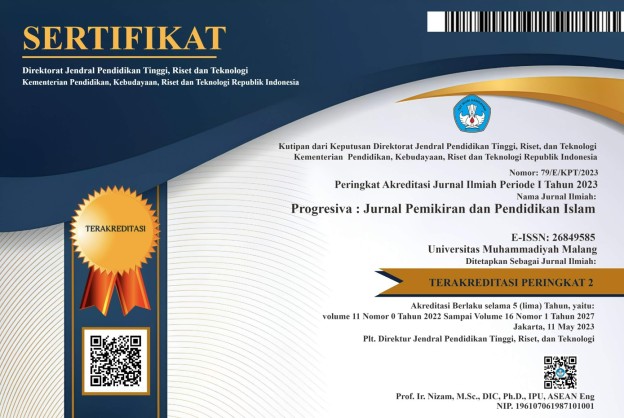The Religious Leaders' View on Deradicalization Efforts through the Islamic Educational Institutions and Anti-Terrorism Law in Yogyakarta
DOI:
https://doi.org/10.22219/progresiva.v11i01.21834Keywords:
Deradicalization, Islamic Education, Islamic Moderation , TerrorismAbstract
The government continues to carry out various de-radicalization efforts in responding to the phenomenon of terrorism and acts of religious-based extremism that have occurred in Indonesia in the last two decades. One of the deradicalization efforts is carried out through the application of the anti-terrorism law, although many parties are still debating the effectiveness of its enforcement. On the other hand, efforts to deradicalize the government through Islamic educational institutions need to be continued because this aspect is considered the most likely to moderate the understanding of the younger generation of Muslims. This study uses a qualitative approach, with a case study method that examines the views of religious leaders (lecturers and activist of Islamic religious organizations) on the role of Islamic educational institutions in Indonesia in the process of deradicalization and counter-terrorism. Clearly, this study reveals the need for the involvement of Islamic educational institutions in encouraging religious deradicalization programs, particularly on several aspects such as character building, moderate meaning of Islamic doctrine, understanding of the diversity of Islamic history and Fiqh, creation of comparative thought narratives, and taking appropriate action initiatives. good. Thus, this research concludes that the government needs to strengthen efforts to deradicalize through Islamic educational institutions and evaluate the effectiveness of implementing anti-terrorism laws.
Downloads
References
Akhtar, S., Rahman, B., Rahman, A. U., Rahim, M., Shah, A., & Khan, J. (2016). The Quranic Concept of Religious Tolerance and its Manifestation in Islamic History. Journal of Applied Environmental and Biological Sciences, 6(3), 136–139.
Al-Ansi, A. M., Ishomuddin, I., Sulistyaningsih, T., & Kartono, R. (2019). Rational choice of following Muhammadiyah and Nahdlatul Ulama and their social and political role in Indonesian society. Open Access Library Journal, 6(11), 1–15.
Asroni, A. (2022). The History of Indonesian Islam (From the Early Period to Emergence of Islamic Kingdoms). LITERATUS, 4(1), 104–117.
Bahtiar, M. A., & Sumari, A. D. W. (2020). The Implementation of The Deradicalization Program in Indonesia: A Case Study of Counterterrorism in Indonesia. In International conference on social and humanities, Jakarta, Indonesia.
Blankinship, K. Y., & Khalid’A, B. (1994). The End of the Jihad State: The Reign of Hisham Ibn’Abd al-Malik and the Collapse of the Umayyads. SUNY Press.
Brown, K. E., & Saeed, T. (2015). Radicalization and counter-radicalization at British universities: Muslim encounters and alternatives. Ethnic and Racial Studies, 38(11), 1952–1968. https://doi.org/10.1080/01419870.2014.911343
Ehiane, S. O. (2019). De-radicalisation and disengagement of the extremist group in Africa: The Nigerian experience. Journal of African Foreign Affairs, 6(2), 123.
Gathmyr, M. R., Suryanto, H., & Rezasyah, T. (2018). Investigating Media Discourse of Radicalization among Indonesian Youth: A Preliminary Research. International Journal, 3(12), 24–34.
Gunaratna, R. (2021). Counter-terrorism in Asia: The state partnership with civil society organizations. In Civil Society Organizations against Terrorism (pp. 14–62). Routledge.
Hew, W. W. (2018). THE ART OF DAKWAH: social media, visual persuasion and the Islamist propagation of Felix Siauw. Indonesia and the Malay World, 46(134), 61–79. https://doi.org/10.1080/13639811.2018.1416757
Hilmy, M. (2020). The rise and fall of “transnational” Islam in Indonesia: The future of Hizbut Tahrir Indonesia (HTI). In Rising Islamic Conservatism inIndonesia (pp. 133–145). Routledge.
Husain, T. (2017). Counter terrorism approaches: with reference to Bangladesh. ABC Journal of Advanced Research, 6(1), 9–16.
Idris, M., bin Tahir, S. Z., Yusuf, N., Willya, E., Mokodenseho, S., & Yusriadi, Y. (2021). The Implementation of Religious Moderation Values in Islamic Education and Character Subject at State Senior High School 9 Manado. Academy of Strategic Management Journal, 20, 1–16.
Indonesian Republic. Undang-Undang Republik Indonesia Nomor 5 Tahun 2018, Pub. L. No. 5 (2018). Retrieved from https://jdih.kemenkopmk.go.id/sites/default/files/2019-08/UU Nomor 5 Tahun 2018.pdf
Kamal, R. (2017). Internalization of moderate Islamic values in education. Islamic Studies Journal for Social Transformation, 67–80.
Kamaludin, F. S., Purnama, T. S., & Zirmansyah, Z. (2021). Religious Moderation Strategy in The Virtual Era and Its Implication in Improving the Quality of Education. Jurnal Pendidikan Islam, 7(2), 205–216.
Mahfud, C., Prasetyawati, N., Wahyuddin, W., Muhibbin, Z., Agustin, D. S. Y., & Sukmawati, H. (2018). Religious Radicalism, Global Terrorism and Islamic Challenges in Contemporary Indonesia. Jurnal Sosial Humaniora (JSH), 11(1), 8–18. https://doi.org/10.12962/j24433527.v11i1.3550
Majumdar, A. (2022). Thematic analysis in qualitative research. In Research Anthology on Innovative Research Methodologies and Utilization Across Multiple Disciplines (pp. 604–622). IGI Global.
Marshall, P. (2018). The ambiguities of religious freedom in Indonesia. The Review of Faith & International Affairs, 16(1), 85–96. https://doi.org/10.1080/15570274.2018.1433588
Marzuki, M., Miftahuddin, M., & Murdiono, M. (2020). Multicultural education in salaf pesantren and prevention of religious radicalism in Indonesia. Jurnal Cakrawala Pendidikan, 39(1), 12–25. https://doi.org/10.21831/cp.v39i1.22900
McRae, D. (2013). State Intervention. In A Few Poorly Organized Men (pp. 157–187). Brill.
Naupal, N. (2017). The Reconstruction of Islamic Education in Indonesia Through MaqÄ á1£ id SharÄ «â€˜ ah of Jaseer Auda. Al-Ulum, 17(2), 267–884.
Olatubosun, A. A., & Ajani, S. T. (2020). Curtailing Social Vices Through Da’wah. Nigerian Journal of the Humanities, 44, 62.
Olsson, S. (2021). Hizb ut-Tahrir’s Caliphal Counter-Narrative. Religions, 12(7), 486.
Osman, M. N. M. (2018). Hizbut Tahrir Indonesia and political Islam: Identity, ideology and religio-political mobilization. Routledge. https://doi.org/10.4324/9781351240222
Porges, M. (2014). Saudi Arabia’s “soft” approach to terrorist prisoners: A model for others? In Prisons, Terrorism and Extremism (pp. 169–182). Routledge.
Priyanto, S., Dermawan, M. K., & Runturambi, A. J. S. (2020). Islah as the key success of terrorist disengagement process in Indonesia. Journal of Al-Tamaddun, 15(1), 157–168.
Rapoport, Y. (2003). Legal diversity in the age of taqlīd: The four chief qāḍīs under the Mamluks. Islamic Law and Society, 210–228.
Rayshahri, M. M. (2008). The scale of wisdom. Icas Press.
Rineheart, J. (2010). Counterterrorism and counterinsurgency. Perspectives on Terrorism, 4(5), 31–47.
Saleh, M. N. I., Nudin, B., Khusaini, K., Alim, P., & Putri, I. A. (2019). Islamic Boarding School and the Deradicalization Efforts of Islamic Education in Madura. Jurnal Pendidikan Islam, 8(2), 259–286. Retrieved from https://doi.org/10.14421/jpi.2019.82.259-286
Scharp, K. M., & Sanders, M. L. (2019). What is a theme? Teaching thematic analysis in qualitative communication research methods. Communication Teacher, 33(2), 117–121. https://doi.org/10.1080/17404622.2018.1536794
Schmid, A. P. (2013). Radicalisation, de-radicalisation, counter-radicalisation: A conceptual discussion and literature review. ICCT Research Paper, 97(1), 22.
Seo, M. (2012). Defining ‘religious’ in Indonesia: toward neither an Islamic nor a secular state. Citizenship Studies, 16(8), 1045–1058.
Setiawan, R., Esti, M., & Sidorov, V. V. (2020). Islam and Politics in Indonesia. RUDN Journal of Political Science, 22(4), 731–740.
Shah, H. A. R., Zada, K., Ali, N. M., & Sahid, M. M. (2022). Peace in ASEAN: Counter-narrative strategies against the ideologies of radicalism and extremism (Goal 16). In Good Governance and the Sustainable Development Goals in Southeast Asia (pp. 194–211). Routledge.
Shah, S. (2006). Educational leadership: an Islamic perspective. British Educational Research Journal, 32(3), 363–385.
Sofyan, A., Lesmana, J. A., & Mustofa, T. A. (2022). The Improvement of Religion Moderation for Terrorism Prisoner through Islamic Education and Education Character. Attractive: Innovative Education Journal, 4(2), 68–81.
Sudrajat, T., Supiana, S., & Zakiah, Q. Y. (2021). Higher Education, Nation Character, and Religious Moderation Program: A Public Policy Perspective. Journal of Asian Social Science Research, 3(1), 73–92.
Sukarieh, M., & Tannock, S. (2016). The deradicalisation of education: terror, youth and the assault on learning. Race & Class, 57(4), 22–38.
Suryadinata, L. (2018). Islamism and the New Anti-Terrorism Law in Indonesia. ISEAS-Yusof Ishak Institute.
Susilo, S., & Dalimunthe, R. P. (2019). Moderate southeast asian islamic education as a parent culture in deradicalization: Urgencies, strategies, and challenges. Religions, 10(1), 45. https://doi.org/10.3390/rel10010045
Tan, C. (2012). Islamic education and indoctrination: The case in Indonesia. Routledge. https://doi.org/https://doi.org/10.4324/9780203817766
Tella, O. (2018). Boko Haram terrorism and counter-terrorism: The soft power context. Journal of Asian and African Studies, 53(6), 815–829.
Ugwueze, M. I., & Onuoha, F. C. (2020). Hard versus soft measures to security: Explaining the failure of counter-terrorism strategy in Nigeria. Journal of Applied Security Research, 15(4), 547–567.
Widodo, A. (2019). Moderation of Islamic Education as an Effort to Prevent Radicalism (Case Study of FKUB Singkawang City, Kalimantan, Indonesia). Nadwa, 13(2), 271–294. https://doi.org/10.21580/nw.2019.13.2.5086
Downloads
Published
How to Cite
Issue
Section
License
Copyright (c) 2022 M Nurul Ikhsan Saleh

This work is licensed under a Creative Commons Attribution-ShareAlike 4.0 International License.


















